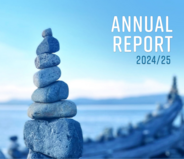The BC Ombudsperson says people in British Columbia are facing a growing mix of pressures when trying to access fair public services. Services are becoming more complex to navigate. Public sector budgets are tightening. And increasingly, decisions are being shaped by AI or automated decision making.
In his 2024/25 Annual Report released on 18 November 2025, Ombudsperson Jay Chalke says many of the matters reaching his office are now crisis-driven, and points to cases where people were left without essential supports until his office intervened.
- In one instance, a woman went without money for food after her income-assistance cheque was withheld, causing an avoidable gap in basic supports.
- In another, a man living with a disability was wrongly denied accessible transit, even though the law made him automatically eligible.
- And a property owner was issued a bylaw notice of more than $1,000 for maintenance on a lot that wasn’t even his.
These are concrete examples of how small administrative decisions can have outsized impacts when systems are under strain. “When systems are stretched, fairness is often the first thing to erode – and the most important thing to restore,” notes Chalke.
These cases reflect tensions felt across the province, where more people are turning to the Ombudsperson for help as public services struggle to keep pace with demand. In 2024/25:
- More than 17,500 people turned to the office for help navigating unfair public services.
- The office handled roughly 635 new fairness or wrongdoing concerns each month.
- Over one-third of complaints were related to housing, affordability, and health care, reflecting the service gaps people are feeling most acutely.
The rising complexity in the problems the public is bringing to the office and identified in last year’s report has only intensified. Today, nearly half of the office’s settled complaints involve complicated, multi-layered issues that take longer and require more detailed analysis to resolve.
Public services are also changing fast, as AI and other automated systems play a bigger role in how decisions are made and communicated. Since 2024/25, the office has begun developing new expertise in digital fairness to ensure transparency and human oversight keep pace with technology.
“Fairness doesn’t stand still,” says Chalke. “As public services evolve, whether through new technology, new demands, or new expectations, our oversight must evolve with them.”
Kindly click here to read the full article.
The BC Ombudsperson's report can be accessed here.
Source: British Columbia Ombudsperson, Canada

